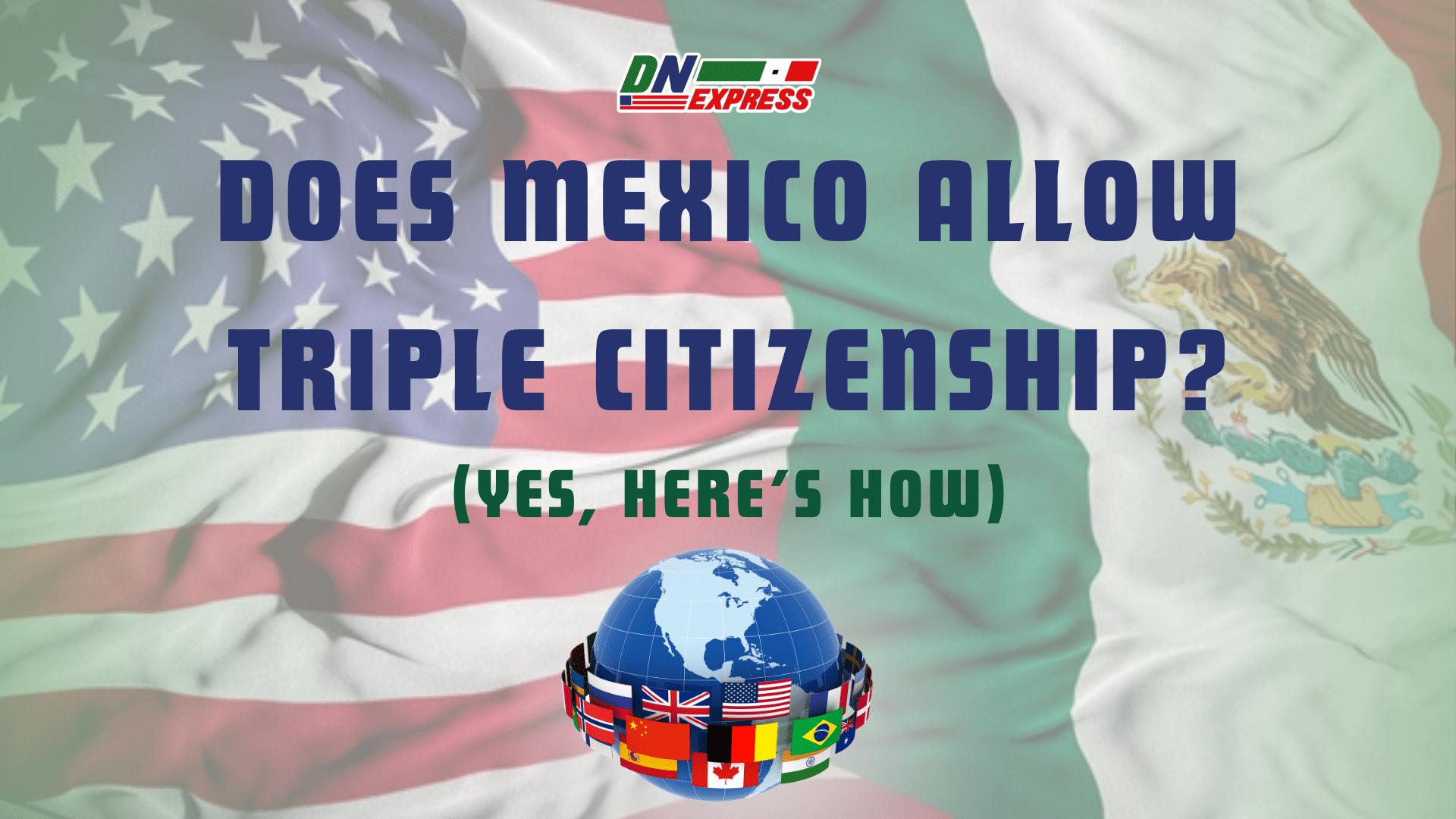
Yes, Mexico allows triple citizenship if you're Mexican by birth or descent. You can legally hold U.S., Mexican, and a third nationality without renouncing any of them.
If you were born in the U.S. to Mexican parents, or are applying for your kids, you can secure triple citizenship legally. The same applies if you're dealing with missing documents, past rejections, or estranged from a Mexican-born parent.
You need to know the rules and avoid pitfalls that could put your citizenship at risk.
We help U.S.-based families unlock Mexican citizenship quickly and legally, no consulate appointments required, and no confusion about what to do next.
Want to understand exactly how it works, what risks to avoid, and how to apply without losing your other nationalities? Keep reading.
Mexico allows triple citizenship in most cases, especially if you're Mexican by birth. The United States and Canada also recognize multiple nationalities.
What matters most is how you acquired each citizenship (birth, descent, naturalization) and whether you meet each country's rules.
Who Triple Citizenship Affects Most (With Scenarios)
Triple citizenship goes beyond possiblle—it's increasingly typical for Mexican-American families. But how it applies depends on your personal background, paperwork, and family connections.
Here's how it plays out for the people we help every day:
- U.S.-born adults with Mexican parents. You likely qualify for Mexican citizenship by descent, and you can keep your U.S. nationality.
Even if you've never dealt with Mexican documents, we can help make it official, no renunciation or relocation required.
- Parents applying for their U.S.-born children. If you're Mexican by birth and your child was born in the U.S., they can hold U.S., Mexican, and even a third nationality (if applicable through another parent).
We help families secure their kids' birthrights without consulate delays.
- Adults with incorrect or missing documents. Many people assume they're disqualified due to name mismatches, lost birth certificates, or errors in old records.
We are specialized in correcting these issues, making you eligible when others say you're not.
- People who were denied at the consulate. A consulate rejection doesn't mean you're ineligible, it often means something was filed wrong or misunderstood.
We review denied cases, identify the problem, and fix it without needing another appointment.
- Our legal team recovers documents, handles everything directly, and completes your application without needing their consent, signature, or involvement.
Does Mexico Allow Triple Citizenship?
Yes, Mexico allows triple citizenship, especially for those who are Mexican by birth. There is no legal limit on how many nationalities a natural-born Mexican can hold.
That means you can carry U.S., Mexican, and even a third passport without losing your status in Mexico.
However, if you became Mexican through naturalization, the rules are stricter. Naturalized citizens risk losing their Mexican nationality if they acquire another one later or leave Mexico for five years without declaring continued residency.
Mexico does require an oath of renunciation when you naturalize, but this clause is largely symbolic and rarely enforced. In practice, thousands of people maintain three (or additional) nationalities legally.
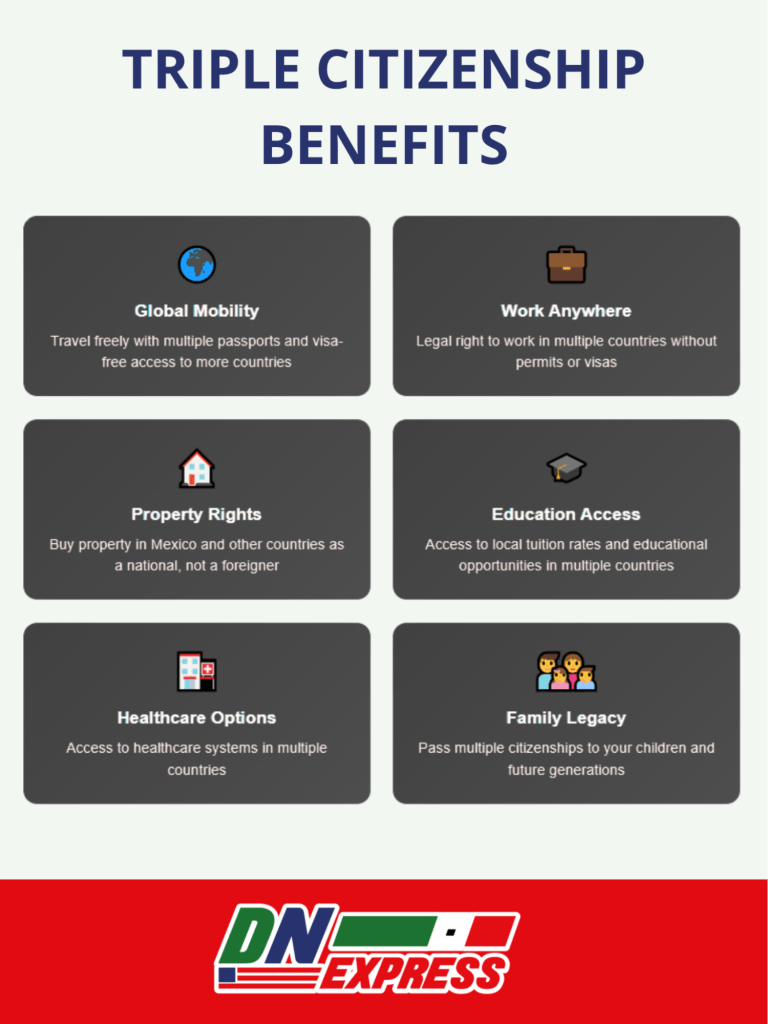
Countries That Allow Triple Citizenship
Many countries now recognize triple citizenship, including the United States, Canada, Mexico, Brazil, France, Portugal, and most of the European Union. These countries have no legal cap on how many nationalities you can hold, as long as each one was acquired lawfully.
However, some nations still take a strict stance. India, China, and Singapore do not allow dual or triple citizenship.
If you acquire another nationality while holding one from these countries, you may be forced to renounce your original status.
For Mexican-American families looking to expand global opportunities, the ideal triple passport combo often includes:
- U.S. passport for global mobility and benefits
- Mexican passport for Latin America access, cultural connection, and property rights
- EU or Caribbean passport (via ancestry or investment) for visa-free travel and business perks
Holding three nationalities can maximize your options for travel, work, healthcare, and education, especially if you navigate the process correctly from the start.
How to Qualify for Mexican Citizenship (and Keep Others)
Mexican citizenship can be acquired in a few different ways, and each path has different implications if you plan to hold multiple nationalities.
Typical Paths to Citizenship:
- By descent (parents or grandparents): If one or both of your parents were born in Mexico, you likely qualify for citizenship by descent, even if you were born in the U.S.
This is the most secure path, and you won't be asked to renounce your current citizenships.
- Birth in Mexico: If you were born in Mexico, you're automatically a Mexican citizen by birth. This means you can legally add other nationalities later without any risk of losing your Mexican status.
- Naturalization: If you became Mexican through naturalization, extra care is needed.
Naturalized Mexicans are required to swear an oath renouncing prior citizenships (though this enforcement is minimal), and they may risk loss of nationality if they later naturalize elsewhere or reside abroad for over five years.
In short: If your connection to Mexico comes from birth or blood, you're in the strongest legal position to maintain multiple citizenships. And if your case is complex, DNExpress can walk you through every requirement safely.
Legal Considerations for Triple Citizens
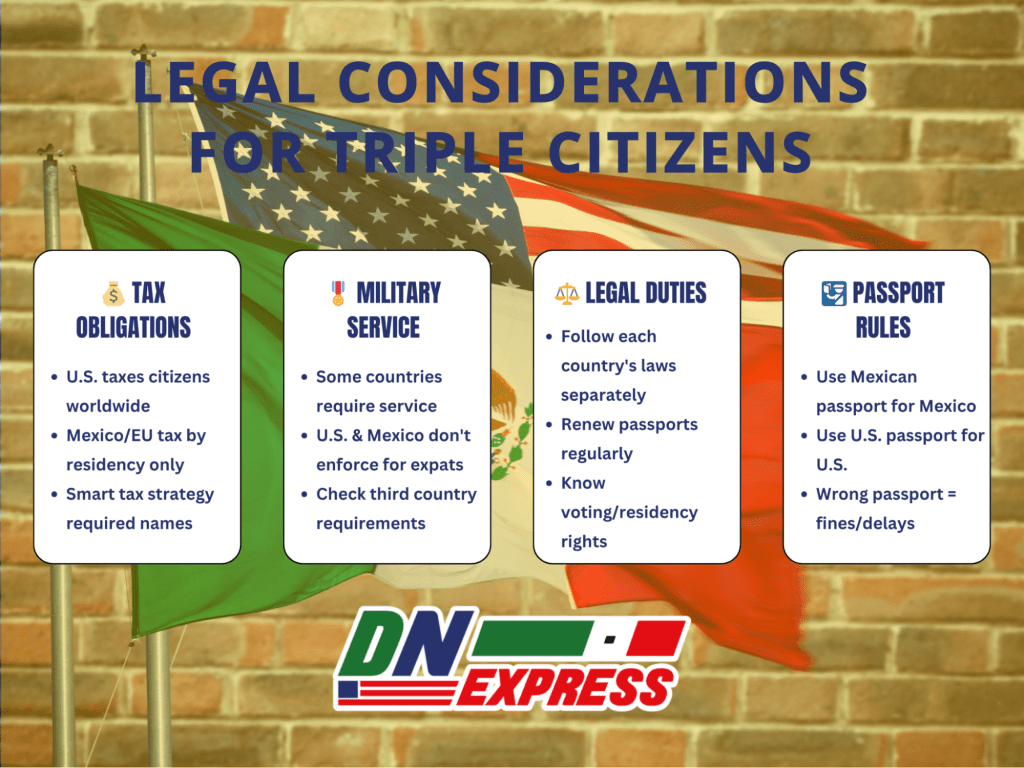
Holding three citizenships opens up a world of opportunity, but it also comes with legal responsibilities that vary by country.
Here's what you need to know to stay compliant and avoid costly mistakes.
1. Tax Obligations
The United States taxes its citizens worldwide, regardless of where they live. If you have a second or third nationality, you may still need to report global income to the IRS.
Meanwhile, countries like Mexico and most of the EU tax based on residency, not citizenship. A smart tax strategy is necessary for anyone with assets or income across borders.
2. Military or Civil Service Requirements
Some countries require military service or public obligations from citizens, particularly males of a certain age.
The good news? Mexico and the U.S. generally do not enforce military service obligations for dual or triple nationals living abroad.
3. Legal Duties Vary Country by Country
Triple citizens must follow each country's laws separately.
This includes renewing passports, fulfilling civic obligations, and staying aware of residency or voting rights.
What's legal in one nation may be restricted in another.
4. What Passport Should You Travel On?
You should always enter and exit a country using that country's passport. For example:
Use your Mexican passport to enter or leave Mexico.
Use your U.S. passport when entering or leaving the United States.
This avoids confusion at customs, potential fines, or being treated as a foreigner in your own country.
Triple citizenship is legal, but only if managed correctly. We help ensure you don't make mistakes that could put your rights or status at risk
Potential Risks & Frequent Worries
Triple citizenship is legal, but it's not always simple.
Here are the top concerns we hear from clients, and what the law actually says:
Will I lose my Mexican citizenship by naturalizing elsewhere?
Not if you were born Mexican. The law protects natural-born citizens even if they acquire other nationalities later.
However, if you became Mexican through naturalization, you could risk losing it if you naturalize elsewhere without proper notice or fail to meet residency requirements.
What if I don't live in Mexico?
For citizens by birth, there's no requirement to reside in Mexico to keep your nationality.
But naturalized citizens must maintain ties to Mexico or risk revocation after five years of absence.
If that's your case, there are workarounds, but they need to be handled carefully.
Can I use a U.S. passport only in Mexico?
No, you should use your Mexican passport when entering or exiting Mexico, even if you're also a U.S. citizen. Using a foreign passport may cause confusion, fines, or delay, and in some cases you'll be charged as a tourist.
What if I was rejected before, can I try again?
Yes. In fact, many DNExpress clients come to us after being denied at the consulate. Most rejections happen because of document errors, name mismatches, or misunderstandings, not because the person was actually ineligible.
These cases are often 100% fixable with legal support and the right strategy.
Many of our clients thought they didn't qualify, only to learn that they did, all it took was the right guidance.
Why Most DIY Attempts Fail
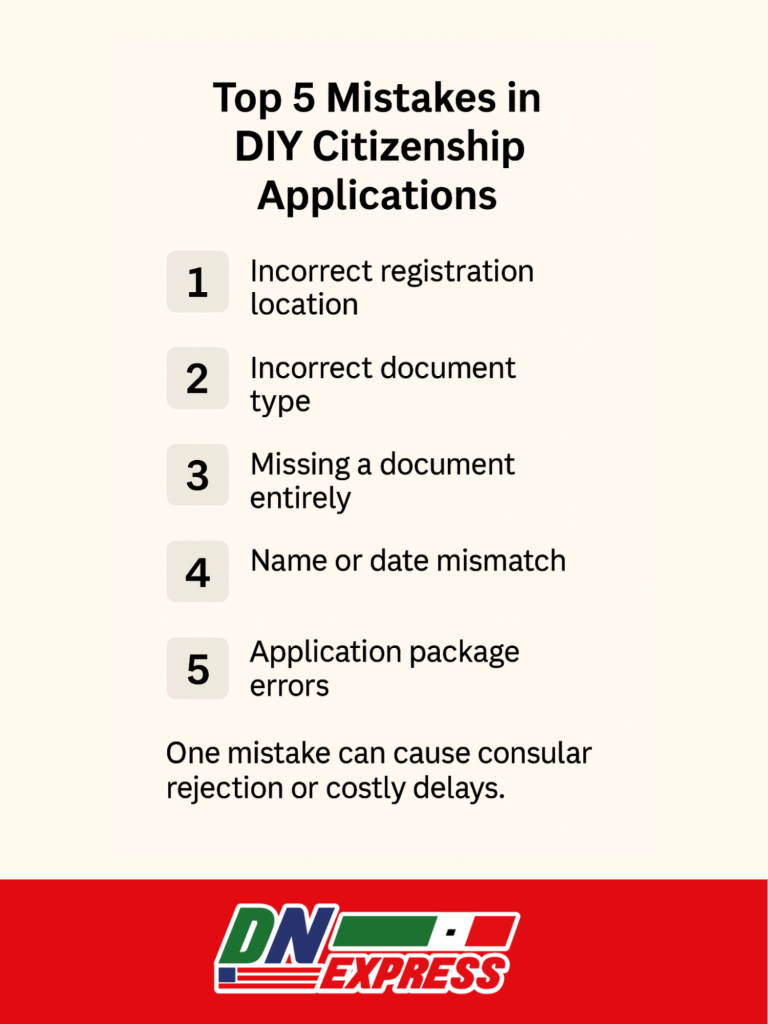
Trying to secure triple citizenship on your own might seem doable, but for many, it turns into a frustrating, expensive loop of delays and dead ends.
Here's why most self-guided attempts don't succeed:
1. Inconsistent Consulate Rules
Mexican consulates across the U.S. interpret requirements differently. What works in Los Angeles may get rejected in Houston.
Some demand documents that aren't legally required, while others misapply nationality laws altogether.
2. Rejections Due to Small Errors
Something as simple as a misspelled name or wrong date on a birth certificate can trigger denial.
Consulates rarely explain what's wrong or how to fix it, leaving applicants confused and stuck. Document corrections and name changes often require legal assistance.
3. Mistakes in Document Corrections
Fixing documents (like a parent's birth certificate or your CURP) involves legal filings in Mexico, not quick forms.
One wrong step can invalidate your application or delay it by months.
4. Misbeliefs That Lead to Inaction
- Many people wrongly believe they:
- Must speak fluent Spanish
- Must live in Mexico
- Need their parents' permission or presence
- Have to go through the consulate
None of that is true. But these myths stop thousands of eligible people from applying.
We've rebuilt cases that others gave up on, because we know the law, the loopholes, and the process better than anyone.
We don't rely on consulates. We get it done legally, correctly, and from the U.S.
Why Use DNExpress for Triple Citizenship Help
Triple citizenship doesn't have to be complicated, if you work with people who understand the system from the inside out.
We've built our entire service around making Mexican citizenship accessible, legal, and stress-free, especially for U.S.-based families juggling multiple nationalities.
Here's what sets us apart:
No Consulate Visit Required
We handle everything remotely. That means no appointments, no waiting rooms, and no flying to Mexico. You don't even need to speak Spanish or show up in person.
Licensed Mexican Attorneys, Not Paperwork Processors
Your case goes beyond processing by a third party or junior clerk. Our in-house legal team includes licensed Mexican attorneys who know both U.S. and Mexican law and can answer your toughest legal questions.
Affordable, Fixed Pricing with Payment Plans
We believe families shouldn't go broke trying to reclaim their identity. Our pricing is transparent, flat-rate, and includes flexible payment plans.
No hidden fees. No upselling.
Specialists in Tough, Rejected, or Incomplete Cases
Denied by the consulate? Missing your parent's documents? Confused by conflicting advice?
We specialize in complex situations that other firms won't touch.
Trusted by Over 3,000 Clients Nationwide
We've helped thousands of people across California, Texas, Illinois, and beyond, many of whom had already been told “no” before finding us.
We're here to help you reclaim your citizenship, fix broken documents, and secure your legal rights across all your nationalities, quickly, legally, and without the usual red tape.
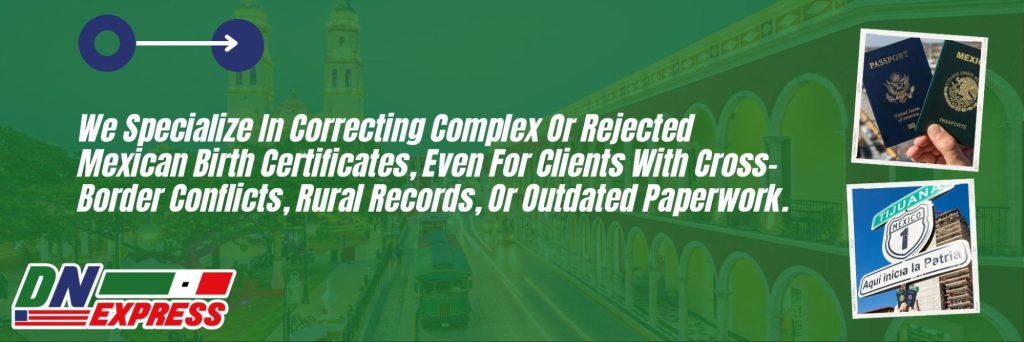
Stories from Triple Citizens We've Helped
Behind every citizenship approval is a personal story, often filled with frustration, disbelief, and, ultimately, relief. Here are a few examples of how DNExpress helped clients who thought it was impossible:
Case: Denied by the Consulate, Approved in 5 Weeks via DNExpress
A client from Houston had been told she didn't qualify for Mexican citizenship due to a clerical error on her parents' birth certificates. After months of dead ends, she came to us.
We corrected the issue, resubmitted her paperwork through our legal channels, and she was approved in over a month.
Case: Applied for Kids' Citizenship, All Done Remotely
A family in California wanted their three U.S.-born children to inherit Mexican citizenship. The parents didn't want to take time off work or travel to the consulate.
We handled everything from document review to registration in Mexico, all without a single in-person visit.
Case: No Parent Contact, Still Got Mexican Nationality
One client hadn't spoken to his Mexican-born father in years and believed that without his consent, he couldn't qualify. We explained that wasn't true.
By locating and legalizing the father's birth record, we secured the client's citizenship, no phone call, no permission, no problems.
These are a few examples of how we turn “no” into “yes” every single week. With the right legal guidance, triple citizenship is not only possible, it's well within reach.
Take the First Step Today
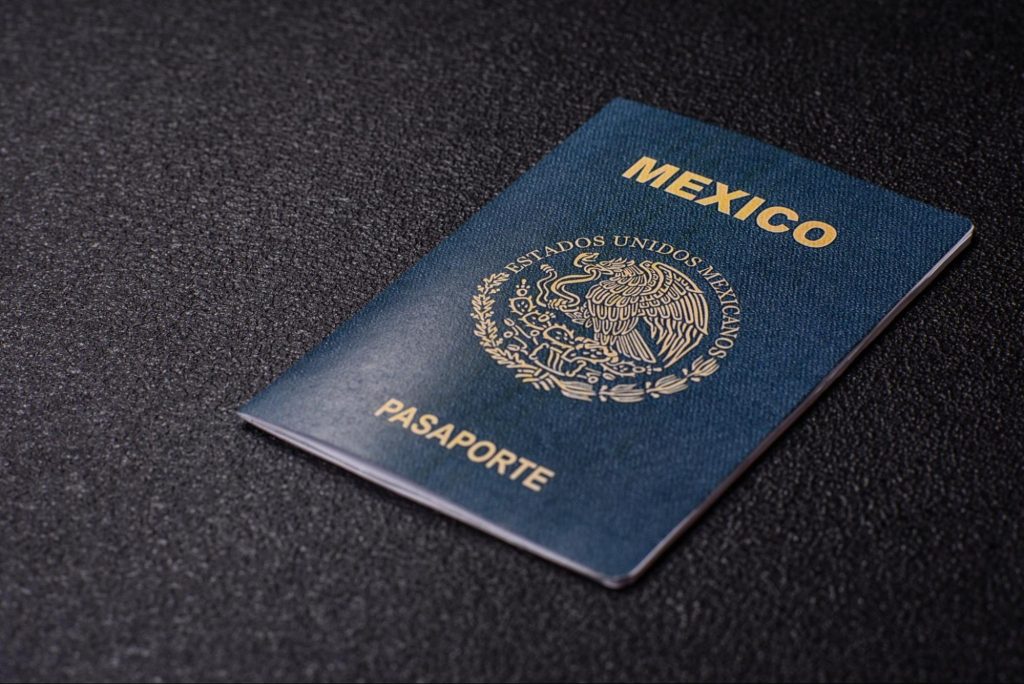
You don't have to navigate this alone. Whether you're getting started, were previously denied, or don't know where to begin, we'll walk you through it step by step.
- Free Case Review We'll evaluate your eligibility, review your documents, and explain your options, no obligation. Get answers to common questions.
- Reach Us by Phone, WhatsApp, or Email Talk to a legal team that knows both sides of the border. We're responsive, bilingual, and here to help.
- Fast Turnaround with Full Legal Support We process most cases in weeks, not months, and provide legal oversight every step of the way.
Ready to secure your triple citizenship the legal way, without the consulate?
Your identity, your roots, and your rights deserve to be recognized. Let us help you make it official.
FAQs Answered Here:
Can Mexican citizens have three citizenships?
Yes, especially if you were born Mexican. There is no upper limit written into the Constitution or federal law.
Can you have dual U.S. and Mexican citizenship?
Yes. Both the U.S. and Mexico recognize dual nationality. If you qualify for both, you can legally retain both.
Does the U.S. allow triple citizenship?
Yes. The U.S. allows multiple nationalities as long as each one is acquired legally. There is no requirement to renounce U.S. citizenship.
Can I get Mexican citizenship if my great-grandparents were Mexican?
Not directly. Mexico only allows citizenship by descent through parents or grandparents.
However, if your parent or grandparent reclaims their nationality first, you may then qualify through them. Recent constitutional reforms have expanded these possibilities.
Can you inherit Mexican citizenship and then naturalize elsewhere?
Yes, if you acquired Mexican citizenship by birth or descent, you can later naturalize in another country without losing your Mexican nationality. The law is only strict for those who became Mexican by naturalization.
Do I have to renounce anything?
No, not if you're Mexican by birth or descent. While the naturalization oath in Mexico mentions renunciation, it's symbolic and not enforced.
What passport should I use when entering Mexico?
Always use your Mexican passport when traveling to or from Mexico, even if you're also a U.S. citizen. Otherwise, you may be charged a tourist fee or face documentation issues.
How many passports can a U.S. citizen hold?
There's no legal limit. The U.S. allows multiple nationalities and passports as long as each is acquired legally.



